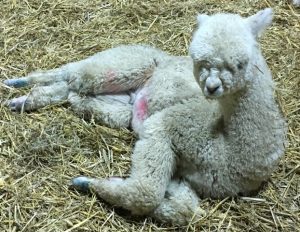colic in Alpaca cria can be fatal and is only obvious to some…
Colic is “tummy ache” for the squeamish amongst you and must be spotted really early on if you want to stand a chance of preventing something worse happening inside the animal it is affecting.
In horses they tend to look at their tummies and kick up at them, rolling on the floor and it must be prevented or they can get a “twisted gut” necessitating surgery with not always optimistic outcomes.
There are very often no reasons whatsoever for the onset of colic, it can be caused by change of pasture, of feed, of weather conditions or nothing at all… but must be spotted early on in any quadruped.
Alpaca are no exception as it can and is often fatal and you need to be on site to look at what your Alpaca do “normally” to know what is “abnormal” behaviour. In colic in a cria, it can be just 20 minutes between a life or death situation.
We have had a tough week last week with my Father very unwell again and a number of other things but just as the week closed last Saturday, I spotted one of our super 2016 cria simply “not being himself”.
Nothing I could put a finger on, he had fed normally so I watched him for a few minutes then all hands to the deck (dinner went by the wayside) to get the whole group into the barns onto straw beds.
You simply cannot observe a sick Cria/Alpaca in the middle of a field in the dark and you cannot bring them in alone!
Even if your own “gut feeling” says “colic” (having bred so many show ponies in my time I have seen it many times) you have to go through every single check from taking the temperature (normal) to checking for constipation (normal) to looking for anaemia (no) and a whole repertoire of possibilities that you eliminate before making your assessment of the potential issue.
Of course, once in, with anything else ruled out, we simply gently kept his head upright and controlled his body movements (not letting him roll) until the pain relief kicked in.
What you must never do (and I shudder when I see it on Facebook and others Blogs) is start to throw anything and everything at the poor animal in the hopes that something will help because you simply don’t know what it is or are not experienced enough yourself to treat it and/or recognise the symptoms.
For those amongst you who are not used to seeing Alpaca lying down, the three to the right of the photo below are “correct” and the cria (baby Alpaca) to the left is absolutely not. If you see a cria lying like this (unless sunbathing) – you need to act fast.
Often the experienced amongst us can avoid complications but we also know when a Vet with stronger drugs is required… this was a Saturday Night Vet call out.
This little one needed a stronger drug than the one I had in my medicine cabinet so a BIG Thanks to Chris at George Vet Group for your assistance through Saturday night in our cold barns, saving this Alpaca Crias life.
The next day, as is often the way, back to normal as if nothing had happened.
Great Team work at Kensmyth but a long Saturday night checking through until morning –
I think he just wanted a night in from the wet grass!

